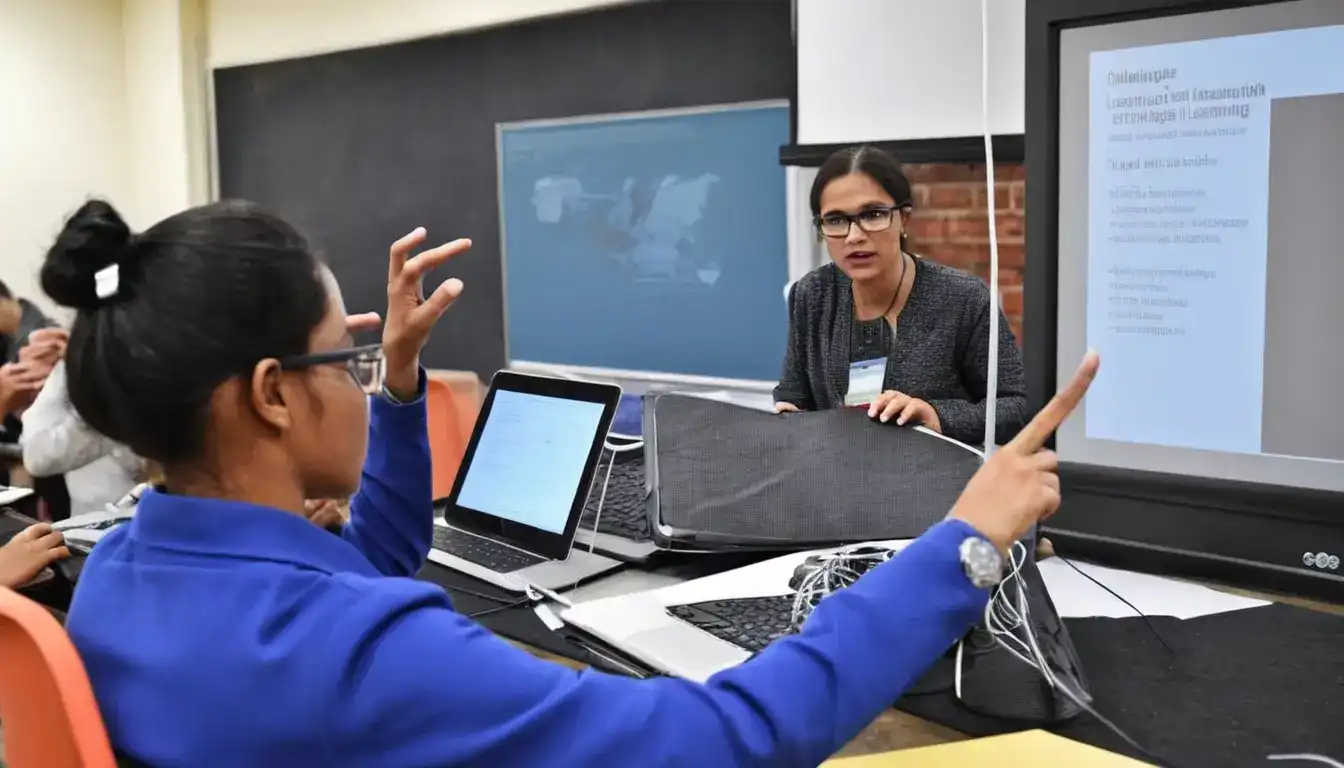Benefits of using technology to improve student learning outcomes
Emily Willis

Photo: Benefits of using technology to improve student learning outcomes
Education is on the cusp of a transformation. Technology, once seen as a classroom distraction, is now emerging as a powerful tool to improve student learning outcomes. By embracing innovative tech solutions, teachers can create engaging experiences, personalize instruction, and empower students to take charge of their learning journeys. Let's delve into the exciting ways technology is reshaping education:
Boosting Engagement: From Passive to Active Learners
Imagine a classroom where textbooks come alive with 3D simulations, historical events unfold in virtual reality, and complex concepts are explained through interactive games. This isn't science fiction; it's the potential of technology in action.
Educational apps and games can transform dry lectures into interactive sessions. Gamification techniques, like points and badges, make learning fun and motivate students to tackle challenging topics. Interactive whiteboards and digital learning platforms create dynamic environments where students actively participate, ask questions, and collaborate with peers. This shift from passive listening to active engagement fosters a deeper understanding and a love for learning.
Tailoring the Journey: Personalized Learning for Every Student
Every student learns differently. Some grasp concepts quickly, while others benefit from a slower pace and multiple explanations. Traditional classrooms often struggle to cater to these diverse needs. Technology steps in to bridge this gap with personalized learning tools.
Adaptive learning platforms assess student strengths and weaknesses, then tailor the learning path accordingly. Students can progress at their own pace, revisiting challenging topics and accelerating through areas they understand. Digital tools can also provide differentiated instruction, offering additional support to students who need it and enrichment activities for those who excel. This personalized approach empowers students to take ownership of their learning and reach their full potential.
Amplifying Accessibility: Reaching All Learners
Technology can break down barriers and ensure education is inclusive for all students. For students with disabilities, assistive technologies like text-to-speech software or screen readers can open doors to a world of knowledge.
Online learning platforms allow students to access educational resources anytime, anywhere. This is particularly beneficial for students in remote locations or those facing health challenges that might limit their ability to attend physical classes. Technology also fosters communication and collaboration among students from diverse backgrounds, promoting inclusivity and understanding within the classroom.
Collaboration Without Borders: The Power of Global Classrooms
The internet has shrunk the world, connecting classrooms across continents. Video conferencing tools allow students to interact with peers and experts from around the globe. Imagine a history class where students in the US collaborate on a project with their counterparts in Europe, or a science class where students virtually visit a research facility in another country. These experiences broaden perspectives, foster cultural understanding, and prepare students for an increasingly interconnected world.
The Teacher as a Guide: Empowering Educators
Technology is not a replacement for great teachers; it's a powerful tool that empowers them. Learning management systems streamline administrative tasks, freeing up valuable time for teachers to focus on lesson planning, student interaction, and professional development.
Technology also provides educators with a wealth of data and insights. Online assessments and learning platforms can track student progress, identify areas of difficulty, and adapt instruction accordingly. This data-driven approach allows teachers to tailor their lessons to meet the specific needs of their students, maximizing the impact of their teaching.
The Road Ahead: Embracing Technology Responsibly
While technology offers incredible benefits, it's important to acknowledge the challenges. Ensuring equitable access to technology and maintaining a healthy balance between screen time and face-to-face interaction are crucial considerations. Additionally, teachers need ongoing training to effectively integrate technology into their teaching practices.
By addressing these challenges and using technology responsibly, we can unlock its full potential to transform education. Technology is not a magic bullet, but it's a powerful tool that can empower students, teachers, and parents to create a more engaging, effective, and personalized learning experience for all.
Remember, this is just the beginning! There are many other aspects of technology in education to explore, such as the use of artificial intelligence for personalized learning or the rise of virtual reality for immersive learning experiences. As technology continues to evolve, the possibilities for enhancing student learning outcomes are truly limitless.
Latest ✨
View Allvibrant cultures of Mexico, China, and India, highlighting their unique customs, traditions, and ways of life. It emphasizes the importance of immersing oneself in these cultures to connect with the soul of a place and create lasting memories.
Emily Willis
Virtual reality (VR) and augmented reality (AR) are transforming the entertainment industry by offering immersive experiences that blur the lines between the real and virtual worlds. VR completely transports users into computer-generated environments, while AR overlays digital elements onto the real world.
Emily Willis
The Pacific Ocean is home to remote and enchanting islands that offer untouched natural beauty, rich cultures, and unique experiences for adventurous travelers. Tips for exploring these hidden gems include researching your destination, packing light, respecting local culture, exploring responsibly, and staying safe.
Emily Willis
concept of "sports for social good," which uses the power of sports to address social issues and create positive change. It highlights the impact of sports on diversity, gender equality, youth development, community engagement, health, and peacebuilding.
Emily Willis
Business
View All
August 5, 2024
How to Create Engaging Content and Convert Visitors to Customerscreating engaging content to attract and retain customers in the digital age. It provides strategies for understanding the audience, setting content goals, creating high-quality content, using storytelling and emotional connection, and optimizing content for conversions. It also covers content formats and distribution, measuring and analyzing content performance, and building relationships with influencers and user-generated content.
Emily Willis

August 5, 2024
How to Improve Your Leadership Skillsleadership skills in achieving organizational success. It discusses various aspects of leadership, including understanding leadership, identifying leadership styles, developing effective communication skills, building trust and credibility, developing emotional intelligence, delegating tasks effectively, embracing continuous learning, fostering a positive work culture, making tough decisions, developing a growth mindset, and building a strong team.
Emily Willis

August 5, 2024
Master Your Business Financial Plan in 5 Stepssecrets to mastering your business financial plan with five simple steps. Learn how to analyze financial data, set measurable goals, and create a comprehensive strategy for success. Unlock profitability, make confident decisions, and ensure a bright future for your business
Emily Willis
Economy
View AllBest Secured Loans for Debt Consolidation with Low Interest Rates | Compare Top Lenders & Save Money on Monthly Payments
Read MoreThe digital economy is rapidly changing the job market, with trends such as remote work, the gig economy, automation, e-commerce, cybersecurity, digital skills, and changes in traditional industries having significant implications. These trends offer both opportunities and challenges, requiring individuals and organizations to adapt by embracing flexibility, investing in continuous learning, and staying abreast of technological advancements in order to thrive in this evolving landscape.
Read MoreIn today's rapidly changing economic landscape, innovation and resilience are more important than ever. Innovation drives progress and competitiveness by creating new ideas and solutions to meet market needs. Resilience helps businesses withstand shocks and bounce back from setbacks by planning strategically and diversifying resources.
Read MoreEntertainment
View All
August 4, 2024
The Latest Music Trends, Artists Influencing Pop Culture, and How Digital Platforms Facilitate the Distribution of Music GloballyThe music industry is constantly changing due to consumer preferences, technology, and the influence of artists. Digital platforms have revolutionized music creation, distribution, and consumption, leading to genre fusion, the rise of independent artists, and collaborative projects. Influential artists like Billie Eilish, BTS, and Taylor Swift have shaped pop culture globally. Streaming services, social media, and direct-to-fan engagement have transformed music distribution. Digital platforms also promote cultural diversity and inclusivity, expand markets and revenue, and drive technological advancements. The industry is also focusing on sustainability and ethical practices. To succeed in the future, stakeholders must embrace digital transformation and champion inclusivity.
Emily Willis

August 5, 2024
Video Games: Enduring Appeal, Immersive Worlds, and Diverse Genresenduring appeal of video games, highlighting their ability to transport players to fantastical realms, challenge their minds, and foster connections with others. It explores the magic of immersive worlds, the vast array of genres available, and the social power of gaming.
Emily Willis

August 5, 2024
Music Universal Language: Connecting and Inspiring Across CulturesMusic has the power to transcend language barriers and connect people on a deep emotional level. It serves as a bridge between cultures, fostering understanding and appreciation for diversity. The universality of rhythm and melody creates a sense of unity, while the diversity of musical styles allows for exploration and creativity.
Emily Willis
Health
View AllRegular exercise is essential for maintaining both physical and mental health. It helps with weight management, cardiovascular health, muscle strength, energy levels, and sleep quality. Exercise also reduces stress and anxiety, improves mood, cognitive function, and self-esteem, and lowers the risk of depression. Different types of exercises, such as aerobic, strength training, flexibility, balance, and mind-body exercises, contribute to overall health. To start and maintain an exercise routine, it is important to start slowly, set realistic goals, find enjoyable activities, stay consistent, and listen to your body.
Emily Willis
Regular physical activity is crucial for maintaining long-term health and well-being. It has numerous benefits, including improving cardiovascular health, aiding in weight management, enhancing mental health, strengthening bones, boosting immune function, and promoting longevity.
Emily Willis
Quality sleep is essential for overall health and well-being, impacting physical, cognitive and emotional functioning. Lack of quality sleep can lead to a variety of health issues, including weakened immune function, heart problems, weight gain and cognitive impairment.
Emily Willis
Trending 🔥
View All
1
3
4
5
6
7
8
9
10
Lifestyle
View AllTechnology
View All
August 5, 2024
Top Unity Software Development Trends to Watch in 2024
Explore the top Unity software development trends that will shape the gaming industry in 2024. From AI integration to VR/AR immersion, cross-platform reach, cloud collaboration, and mobile gaming, Unity is revolutionizing gaming experiences. Stay ahead in the dynamic world of game development with these insights.

August 5, 2024
Top 10 Steam Games of 2024
Discover the 10 best Steam games of 2024 and embark on an unforgettable adventure. From breathtaking open-world epics to thrilling FPS battles, these must-play games will keep you entertained for hours. Get ready to dive into the exciting world of Steam gaming and discover your next favorite game!

August 5, 2024
Application of IoT in Various Industries
The Internet of Things (IoT) has revolutionized various industries by enabling real-time data collection, analysis, and automation. In manufacturing, IoT has led to smart factories, predictive maintenance, and supply chain optimization. In healthcare, IoT has facilitated remote patient monitoring, smart hospitals, and enhanced patient care.

August 5, 2024
Oculus Quest 2 vs HTC Vive Pro – Which Should You Choose?
Oculus Quest 2 vs HTC Vive Pro – which VR headset reigns supreme? Dive into this ultimate showdown to discover the strengths and weaknesses of each, and decide which one is worth your investment. From specs and comfort to content and price, we'll help you make an informed choice.





















